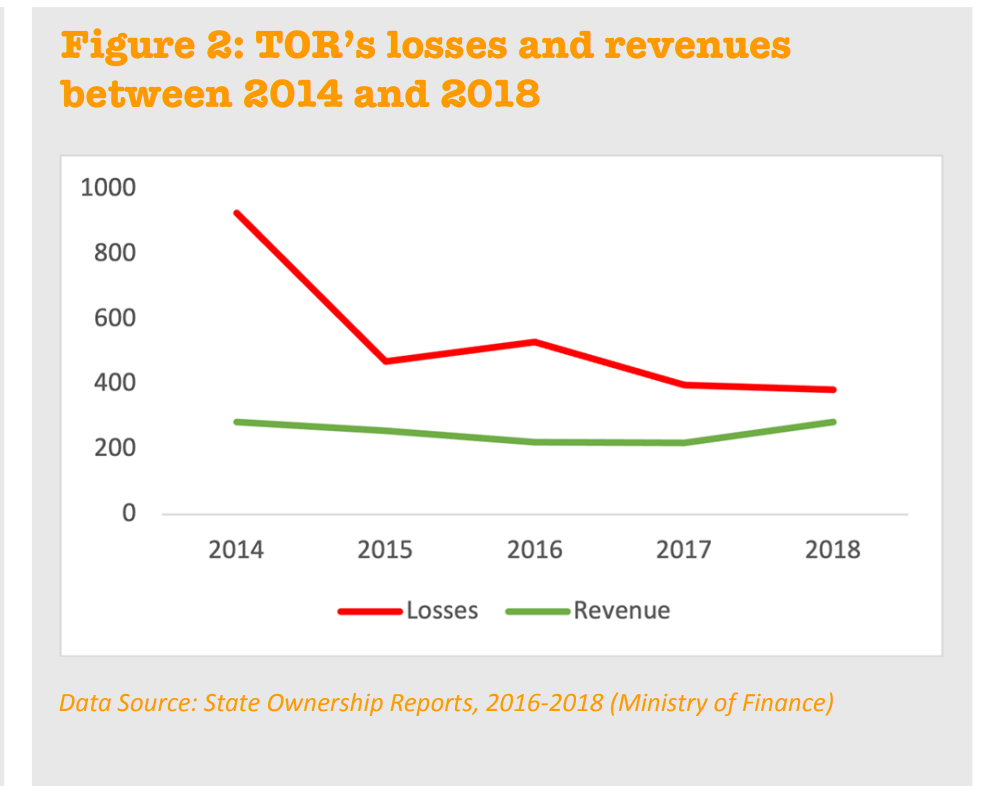- Annual losses stand at GH¢300m
- Public has paid GH¢3.8bn, current debt still GH¢2bn
- Political interference to blame
- Reforms, privatisation advocated
More than GH¢3.8 billion of taxpayers’ funds went into settling Tema Oil Refinery’s (TOR) debts between 2003 and 2020, a report by Africa Centre for Energy Policy (ACEP), has revealed, calling for change in direction in the state-owned enterprise.
Despite this amount, which is worth GH¢8.6 billion in present terms, the refinery still has an outstanding debt of over GH¢2 billion, in addition to annual losses of more than GH¢300 million.
Titled; ‘Plugging that Two-Decade Leak: Strategic Options for the Sustainability of Tema Oil Refinery’, it said the country’s only refinery has become a significant drain on scarce public resources and that the more the public pays for the debt, the worse it gets. “The company has become a highly indebted and high-risk asset, surviving on government guarantees and not thriving as a business on its own,” it said.
TOR has a capacity to process 45,000 barrels per stream day (bpsd) but currently doing only 25,000 bpsd and hardly operates throughout the year.
Cumulatively, the report said TOR’s outstanding debt could be yielding an average annual interest of about GH¢1 billion at the average interest rate (18 percent) on the ESLA bonds.

This interest payment would be a significant drain on scarce national resources. Moreover, it defies prudent fiscal management of tax revenues, particularly when the GoG’s projected capital expenditure in the social sector -GH¢87.37 million – for 2021 only represents about 8 percent of interest payments on TOR’s debts.
Similarly, without interest payments on TOR’s debt, GoG capital expenditure on infrastructure could double. The GH¢1 billion can also triple GoG’s capital budget of about GH¢290 million for the economic sector. This harrowing picture still does not account for the continuous debt accumulation of the company through annual average losses of over GH¢300 million.
Notwithstanding its losses over the years, the report said TOR remains a viable business as a tolling refinery capable of attracting partnerships with established oil traders such as BP, Vitol, among others, but said drastic steps or change in direction are needed to safeguard its long-term
Drivers of TOR’s debt
The company’s total liabilities have consistently stayed above its total assets, resulting in negative equity values and worsening gearing ratios.
For instance, its gearing ratio worsened from negative 200 percent in 2014 to over negative 450 percent in 2018. Chief among the reasons for the worsening plight of the state-owned refinery, the report noted, are political interference and lack of accountability
On political influence, it said TOR’s corporate governance has, over the years, been ridden with unbridled political interference, with managing directors only lasting an average of two years. It added that procurement contracts are imposed by the political system through sole-sourcing, which eventually leads to losses and dubious claims on the company.
Staff recruitment is not spared, with employee numbers skyrocketing from 350 to about 950 between 2003 and 2020, despite the challenges facing the refinery. ACEP said TOR’s current staff strength is comparable to refineries with capacities of about 2.2million.
It also said TOR’s operations have largely been inefficient, affecting revenue generation and the ability to respond to its financial responsibilities.
Others include lack of working capital, leaving TOR to rely on purchase credits and loans to finance its operations; trading losses; underutilised infrastructure; exchange rate losses due to its debt profile been denominated in foreign currency; and contractual claims caused by lack of transparency and proper documentation.
Recommendations
Given that over GH¢3.8 billion of public funds from the TOR Recovery Fund, an act to finance debt incurred by TOR and the Energy Sector Recovery Act have yielded no results, ACEP believes that government should either undertake reforms or allow for some level of private sector participation to turn the refinery’s fortunes around.

“The fundamental question that remains is what strategic options are available to fix the problem with TOR after 18 years of public support to fix the company through the levies. It does appear that Ghana is holding on to a company that generates no value to the taxpayer, rather an unnecessary burden that is passed down several generations,” it read.
Under the first option, it said significant governance reforms that take away control and management of the company by politicians are required. “The persistent political interference curtails accountability that holds management in check.”
For the company to remain a profitable entity under state ownership, ACEP said government must allow the company to operate under sound corporate governance where management and board are held strictly accountable for inefficiencies and mismanagement.
Such reforms must allow the appointment of an MD with industry experience while management should have the free hand to restructure the company, including staff strength, to an optimal level that leads to profitability.
The second recommendation is to allow private participation. Under this, which the report described as the most sustainable given the uncertainties around political behaviour associated with change in governments and within the same government, private capital can used to offset some of the debt and freeze the debt accumulation to allow ESLA to address the existing debt situation. “We recommend a phased approach through initial partial privatisation and the state’s eventual exit to test the effectiveness of privatisation,” the report said.










